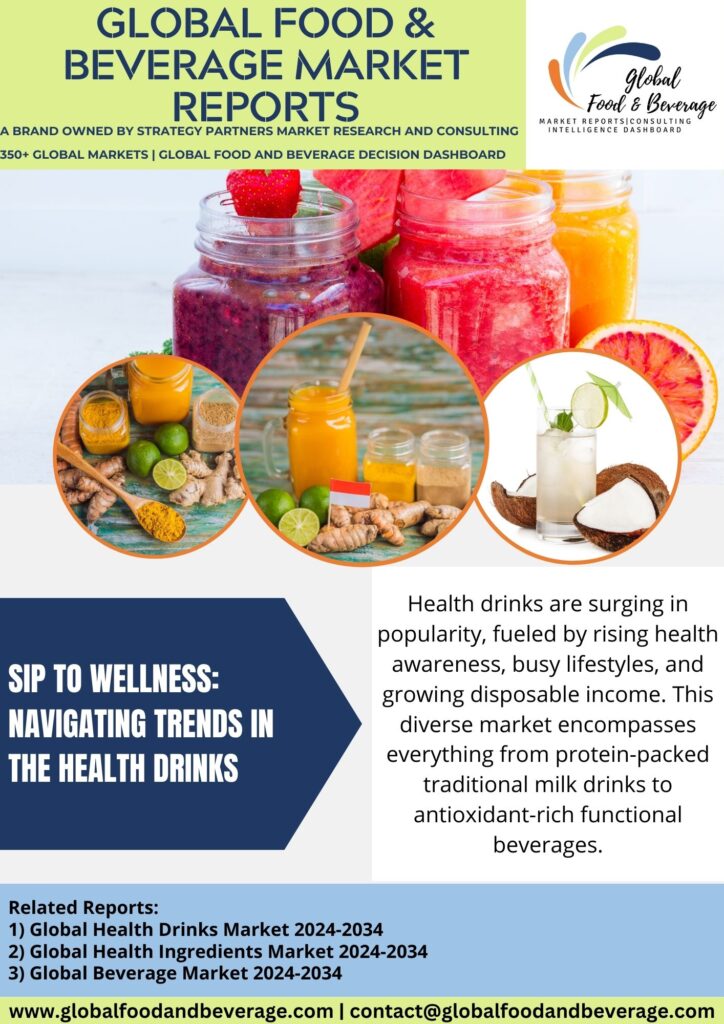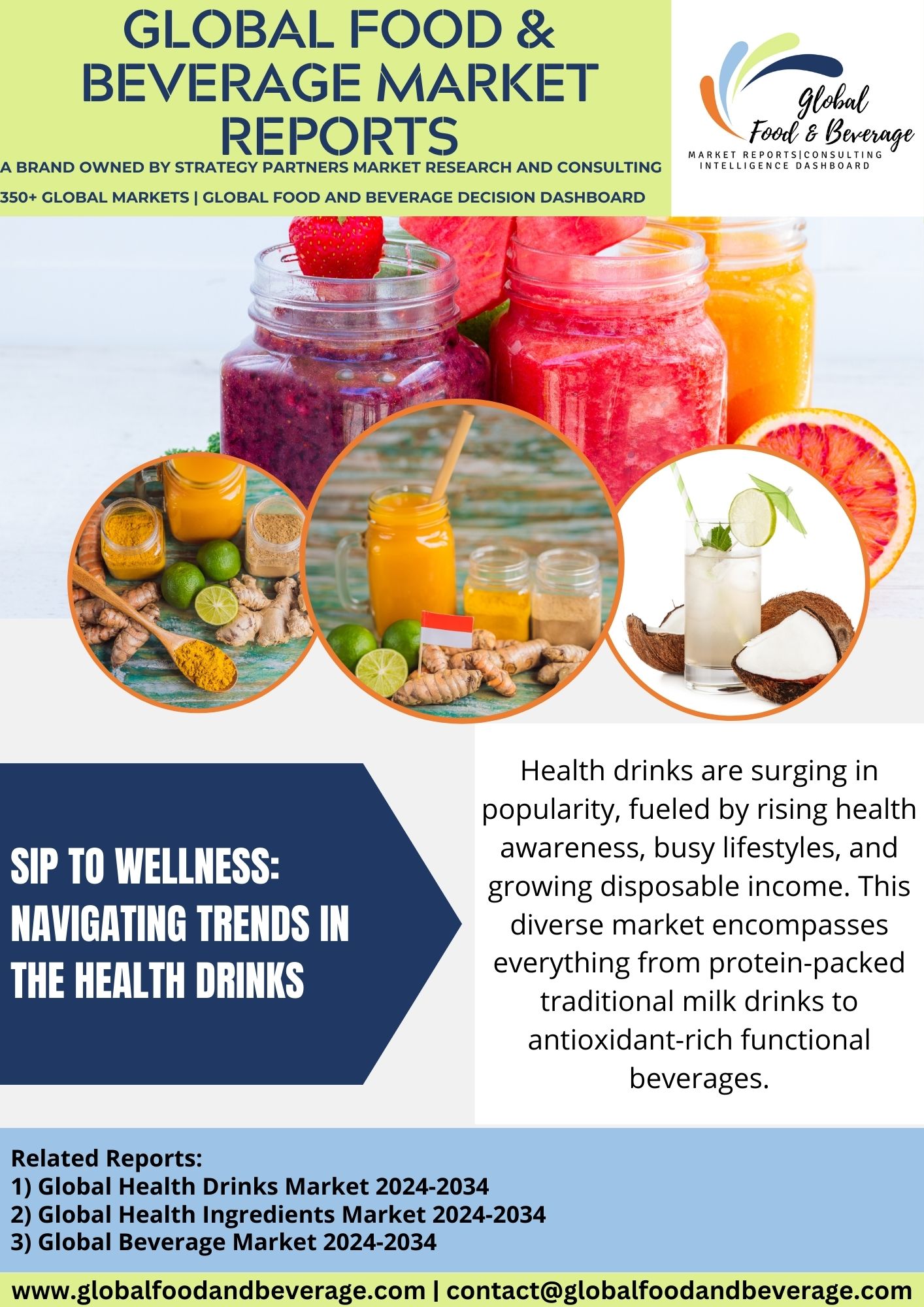Sip to Wellness: Navigating Trends in the Health Drinks Market
Health drinks have become an integral part of modern lifestyles, offering a convenient and flavorful way to supplement nutritional needs and promote overall well-being. These beverages are formulated to provide a boost of essential vitamins, minerals, and other beneficial compounds that support various aspects of health. Health drinks come in diverse forms, ranging from vitamin-infused water and nutrient-rich smoothies to herbal teas and fortified juices.

One of the key advantages of health drinks is their ability to deliver targeted nutritional benefits in a convenient and easily consumable format. These beverages often contain a combination of vitamins, antioxidants, and electrolytes designed to enhance hydration, boost immunity, or provide energy. Additionally, health drinks may include functional ingredients like probiotics, collagen, or herbal extracts, further expanding their potential health-promoting properties.
The popularity of health drinks is attributed to their versatility and appeal to individuals seeking a quick and accessible way to support their health goals. Many health drinks are marketed as refreshing alternatives to sugary sodas and traditional beverages, offering a guilt-free option for those conscious of their sugar intake. The variety of flavors and formulations allows consumers to choose drinks that align with their specific health needs and taste preferences.
Beyond their nutritional content, health drinks often incorporate innovative ingredients associated with wellness trends, such as adaptogens, superfoods, and plant-based extracts. These additions aim to provide a holistic approach to health by addressing not only basic nutritional requirements but also offering potential benefits for stress management, cognitive function, and other aspects of well-being.
As consumers increasingly prioritize health and wellness, the market for health drinks continues to expand. The convenience, variety, and potential functional benefits make these beverages a popular choice for individuals seeking a convenient and enjoyable way to enhance their daily nutrition. Whether consumed as a part of a balanced diet or as a targeted supplement, health drinks play a role in supporting a holistic approach to maintaining and improving overall health.
ADVANCEMENTS
Health drinks have transformed the beverage industry, reflecting a growing emphasis on functional and wellness-oriented products. One significant breakthrough is the integration of innovative ingredients and formulations to enhance the nutritional profile of health drinks. Producers are incorporating superfoods, adaptogens, vitamins, and minerals, creating beverages that offer targeted health benefits such as immune support, energy boost, and stress reduction.
The development of personalized and customizable health drinks is gaining traction. Companies are leveraging technology and data analytics to tailor beverages to individual preferences and health needs. This trend aligns with the broader movement towards personalized nutrition, allowing consumers to make beverage choices that align with their specific dietary goals.
Advancements in beverage technologies contribute to improved taste, texture, and stability in health drinks. Techniques such as cold-pressed extraction, microencapsulation, and nanoemulsion enhance the bioavailability of bioactive compounds, ensuring that consumers receive the maximum benefits from the added ingredients.
The exploration of alternative bases for health drinks is expanding. Beyond traditional water and fruit juice bases, producers are incorporating plant-based milk alternatives, coconut water, and functional teas to create diverse and appealing options. This aligns with the demand for plant-based and dairy-free alternatives in the beverage market.
Innovations in sustainable packaging and ethical sourcing practices contribute to the overall appeal of health drinks. Consumers are increasingly conscious of the environmental impact of beverage packaging, driving producers to adopt eco-friendly materials and transparent sourcing practices.
The rise of functional beverages in various formats, including ready-to-drink shots, concentrates, and powders, caters to the diverse preferences and lifestyles of consumers seeking convenient and effective health solutions. As the demand for health-conscious beverages continues to grow, ongoing research and development are likely to bring further innovation to the health drinks market.
CHALLENGES
Health drinks, including functional beverages and nutritional drinks, face various challenges across production, formulation, market competition, and consumer perception. One significant challenge lies in formulating health drinks that not only provide functional benefits but also meet taste preferences and sensory expectations. Achieving a balance between health benefits and palatability is crucial for consumer acceptance.
Quality control in health drink production is an ongoing challenge. Ensuring the stability of active ingredients, maintaining product freshness, and avoiding nutrient degradation during processing and storage require rigorous quality control measures. Consistency in product quality is essential to meet regulatory standards and consumer expectations.
Regulatory compliance poses challenges in the health drinks industry. Adhering to diverse regulations related to health claims, ingredient labeling, and safety standards demands continuous diligence to ensure transparency and compliance with evolving regulatory landscapes.
Market competition is intense, with numerous health drink products entering the market. Successfully differentiating products, addressing diverse health needs, and maintaining a competitive edge demand continuous innovation in formulations, flavors, and marketing strategies.
Consumer education is crucial for the successful adoption of health drinks. Effectively communicating the health benefits, proper usage, and scientific basis behind these drinks is essential for building consumer trust and promoting informed choices.
Sustainability considerations, including packaging and ingredient sourcing, are emerging challenges in the health drinks industry. Meeting consumer demands for environmentally friendly practices and responsibly sourced ingredients adds complexity to the production and marketing of health drinks.
CONCLUSION
Health drinks epitomize a modern paradigm where taste meets wellness, catering to the growing demand for functional beverages. As consumers prioritize holistic well-being, these drinks offer a convenient and flavorful conduit for essential nutrients, botanical extracts, and superfoods. The industry’s response reflects a commitment to harmonizing taste, nutrition, and functionality. Health drinks not only quench thirst but also contribute to the daily nutritional regimen, aligning with a global shift towards mindful consumption. The future holds promise for continual innovation, diverse formulations, and a flavorful journey where every sip embodies a fusion of taste and vitality, enriching the daily rituals of wellness-conscious individuals.
